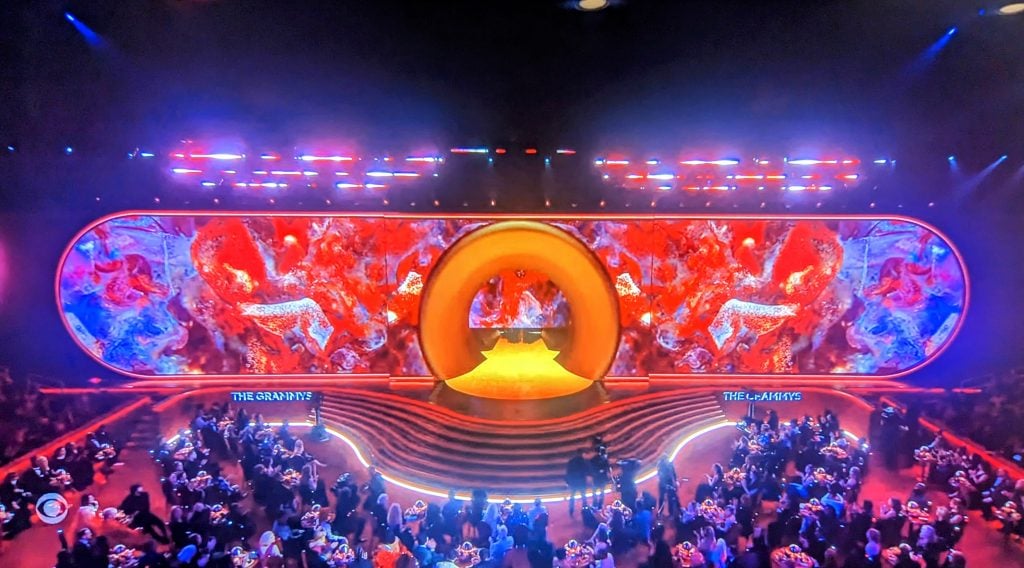Pop Culture
Why A.I. Artist Refik Anadol Was the Real Breakout Star of the 65th Grammy Awards
Selections from the artist's "Machine Hallucinations" series backdropped the awards ceremony.

Selections from the artist's "Machine Hallucinations" series backdropped the awards ceremony.

Caroline Goldstein

Music’s biggest stars turned out in force last night for the 65th Grammy Awards, where Beyoncé cemented her status as the GOAT, receiving four awards and breaking the record for the most Grammy wins of all time. Bad Bunny, Lizzo, Harry Styles, and Adele also got their due—and it all took place against backdrops created by A.I. art star Refik Anadol.
The 38-year-old media artist, whose latest show “Refik Anadol: Unsupervised” is currently on view at the Museum of Modern Art in New York, literally set the stage at the newly rechristened Crypto.com Arena in Los Angeles.
Dear friends, this year we collaborated with Grammys and shared our Machine Hallucinations — Space and Nature series during the ceremony! Deeply grateful for the Recording Academy for selecting our AI Data Paintings for this historic moment! pic.twitter.com/uTFlZO3KNA
— Refik Anadol (@refikanadol) February 6, 2023
The Grammy backdrops, which consisted of swirling hues of crimson, fuchsia, cerulean, and violet, are part of Anadol’s ongoing series “Machine Hallucinations—Space and Nature,” which draws on a massive dataset of more than 300 million publicly available nature images, processed through software created by the artist and his studio.
The “extremely intelligent lava lamp,” as described by Artnet News’s Ben Davis, was an aesthetically pleasing onstage complement as awards including Best Global Music Album, Best Country Duo Performance, and Best Audio Book were handed out.
Although he’s been a fixture in the art world for years, Anadol’s work has been gaining serious traction with the surging interest in NFTs, artificial intelligence-based media, and the public’s evergreen love of colorful and dynamic immersive experiences.
His work has been featured at the Venice Architecture Biennale, projected onto the Frank Gehry-designed Walt Disney Concert Hall in Los Angeles, and shown at institutions around the world from the Centre Pompidou to the National Gallery of Victoria.
Anadol has been making market waves, too.
In 2021, eight NFTs from Anadol’s “Machine Hallucinations—Space” series, tailored to the metaverse, sold for a combined $5.06 million in Hong Kong, setting a new record for the most valuable single artist NFT collection sold in Asia. In 2022, Christie’s closed out its 21st-century evening sale with a newly minted NFT that Anadol created in homage to Antoni Gaudi’s iconic Casa Batlló, which was projected onto a screen at the auction house’s august Rockefeller Center headquarters. The work sold in under three minutes for a whopping $1.4 million.
More Trending Stories:
Explained: What Is Corecore, the Dada-esque ‘Artistic Movement’ Now Trending on TikTok?
The Art Angle Podcast: Marc Spiegler on the Evolution of the Art Business (and Life After Art Basel)